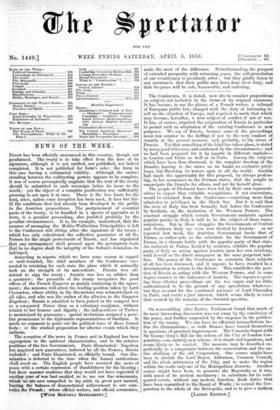The Conference, it is stated, now sits to consider propositions
on subjects not included in the terms of its original summons. It has become, to use the phrase of a French writer, a tribunal of European public law, charged with the, duty of informing it- self on the situation of Europe, and required to mark that which may become, hereafter, a new subject of conflict if not of war. It has, of course, required the cooperation of Russia in particular to permit such an adaptation of the existing Conference to ROW purposes. We say of Russia, because some of the proceedings must run counter to the feefings if not to the very conduct of Austria at the present moment, and, probably, to the views of Prussia. Yet that something of the kind has taken place, is stated by many good witnesses, and confirmed by the circumstances ; and we had been prepared for it by reports in different capitals— in London and Turin as well as in Paris. Among the subjects which have been thus discusssd, is the complete freedom of the Danube, .leaving to the states on its banks no exclusive privi- leges, but throwing its waters open to all the world. Austria had made the opportunity for this proposal, by always profess- ing, in her assurances to the German states, that she sought to emancipate the Danube for others, and. not for herself alone.
The people of Piedmont have been led by their own represent- ;dives to expect that valuable recognitions, if not concessions, would be obtained from the Conference—something more than admission to privileges in the Black Sea. But it is said that the state of Italy has been formally laid before the Conference by Sardinia, on the invitation of the Western Powers. The constant struggle which certain Governments maintain against popular parties in Italy is said to be the subject of these repre- sentations. But in those struggles the Governments of Central and Southern Italy arc even now abetted by Austria : as we reported last week, the Austrian Government backs that of Parma, or rather acts as the substitute for the Government of Parma, in a chronic battle with the popular party of that state. An outbreak at Padua, headed by students, exhibits the popular party of Italy as acting against Austria upon her own territory, with herself as the direct antagonist in the same perpetual war- fare. The power of the Conference to entertain these subjects at all has been discussed, and it appears to have resulted in a determination to return to the debate. This establishes the posi- tion of Russia as acting with the Western Powers, and in some degree counter to the influences of Austria. The reports respect- ing these ulterior proceedings are far too vague and too little authenticated to be the ground of any speculation whatever : but they account for the continued presence of Lord Clarendon in Paris, and excite a just interest, which seems, likely to excel that created by the remains of the Oriental question.


































